TRAN SFORM ATIVE NATURE
OF SMALL-GROUP LEARNING IN DENTAL STUDY CLUBS
Spear Education provides dental continuing education for striving dentists that are dedicated to the pursuit of clinical excellence in dentistry

THE
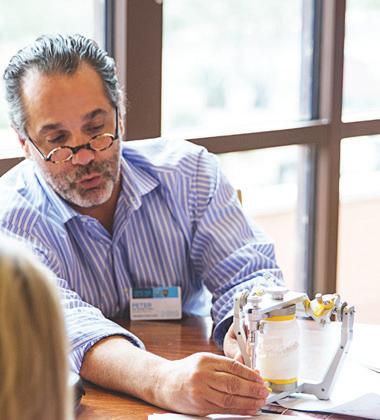



CONTENTS ALL CONTENTS © 2019-2020 SPEAR EDUCATION 4 Introduction 4 8 Impact of small-group learning on the dentist, practice team and patients 8 6 How small-group study improves clinical skill acquisition 6 10 Dental study clubs that blend campus lessons with hands-on collaboration 10
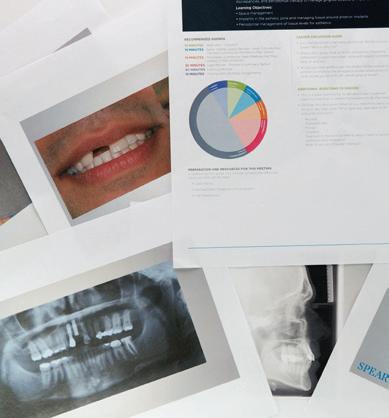

CONTENTS 12 Discovering an ‘interdisciplinary approach to complex cases’ 12 16 About Spear 16
“Individuals within groups have a greater chance of identifying what they do not know, clarifying what they do not fully understand and correcting misconceptions…”
THE TRANSFORMATIVE NATURE OF SMALL-GROUP LEARNING IN DENTAL STUDY CLUBS
— ANAESTHESIA AND INTENSIVE CARE JOURNAL
INTRODUCTION
But does small-group study help dentists to retain clinical information and develop new skills in the continuing education courses they rely upon after dental school?
The intimacy of small groups provides students with a crucial component for lifelong learning, according to research in academic journals that cite the benefits for dentists and other health care professions.
In this white paper, we explore recent findings and identify:

1/ How small-group study reinforces clinical lessons and strengthens skill acquisition
2/ The impact of small-group lessons on general practitioners, specialists and practice team members who seek clinical training to improve patient care
3/ The benefits of balancing traditional CE and campus learning with small-group dental study clubs that reinforce effective interdisciplinary casework
Small-group study is not the answer to every educational challenge. But the benefits are manifold for dentists tasked with keeping pace with industry trends, technological advancements and waning patient commitment to oral health — especially given the need for consistency in the referral process.
A more intimate, supportive and hands-on environment is proven to augment the clinical lessons that drive Great Dentistry.
Today, the small-group learning dynamic is pervasive at all levels of academia, from K-6 homerooms to post-graduate programs.
INTRODUCTION

THE TRANSFORMATIVE NATURE OF SMALL-GROUP LEARNING IN DENTAL STUDY CLUBS 5
HOW SMALL-GROUP STUDY
IMPROVES
CLINICAL SKILL ACQUISITION
Studies show students in small-group learning environments retain more information and perform better on exams than students learning solely in lecture-based settings.
A study published in the journal Anaesthesia and Intensive Care characterized the small-group dynamic as one that includes “active participation, a specific task and reflection” — which allows students to meaningfully process their own experiences, as well as the experiences of their peers, in a way that engenders deep learning.
The relational nature of small groups enables knowledge retention to take place on a deeper level because it draws not only from an individual’s knowledge, but also peer perspectives. While traditional lectures and online learning have clear benefits, the small-group dynamic provides the individual with a forum to ask the group for clarity on clinical lessons.
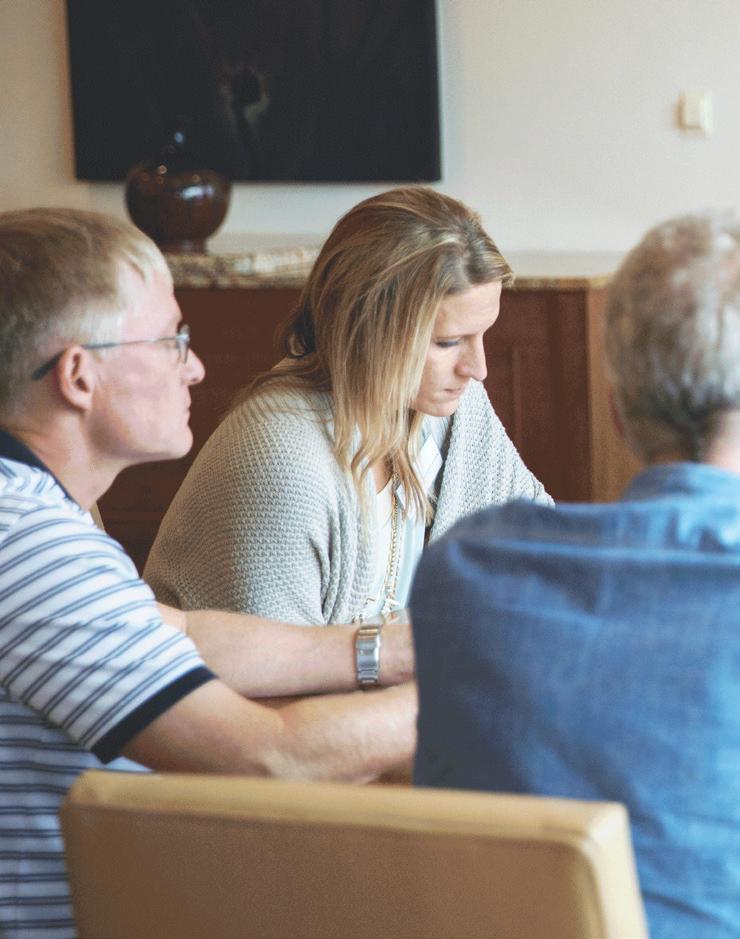
Most classrooms and courses integrate online learning. But small groups provide an ideal environment to dissect campus and online lessons in greater depth with peers.
“Individuals within groups have a greater chance of identifying what they do not know, clarifying what they do not fully understand and correcting misconceptions,” the researcher wrote in Anaesthesia and Intensive Care. “This greater opportunity arises because it is often difficult for an individual working in isolation to realize what they do not comprehend.”
“Individuals within groups have a greater chance of identifying what they do not know, clarifying what they do not fully understand and correcting misconceptions…”
— ANAESTHESIA AND INTENSIVE CARE JOURNAL
The article cites various steps for optimal small-group teaching to health care professions, including:
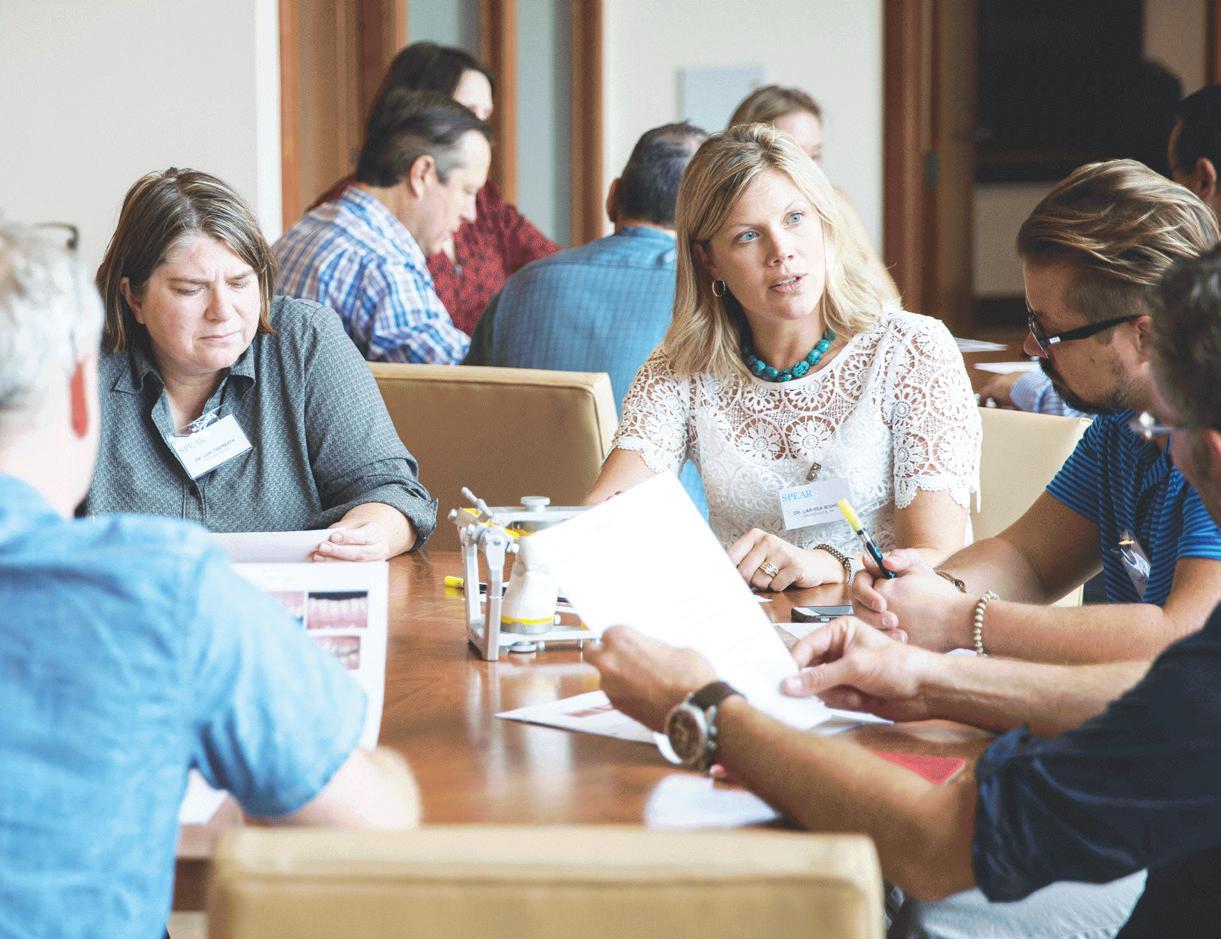
A “skillful teacher” remains a seminal influence on the small group and is required to ensure comprehensive planning and organization of lessons
It is “entirely appropriate” to incorporate more than one educational method to facilitate small groups, including tutorials, free discussion, clinical teaching, simulations, plenary sessions, problem-based learning and team-based learning
The effect of such an active learning method provides a deeper manifestation of knowledge that results in long-term retention of clinical lessons that are “essential to the medical specialist.” The article also listed several critical skills that are enhanced through small group study:
• Task prioritization
• Time management
• Teamwork
• Establishing and maintaining professional interpersonal relationships that are essential in the real world
• Leadership
• Effective communication
• Monitoring of group dynamics, which is crucial to effective team coordination
• Confidence to express and defend ideas
THE TRANSFORMATIVE NATURE OF SMALL-GROUP LEARNING IN DENTAL STUDY CLUBS 7
IMPACT
OF SMALL-GROUP LEARNING ON THE DENTIST, PRACTICE TEAM AND PATIENTS
For general practitioners and specialists facing real-world challenges in their dental practices, immersion in CE subject matter that is less didactic and more focused on peer collaboration supports the development of successful interdisciplinary teams.
A 2016 article in the Journal of Dental Education that studied the effect of small group lessons on first-year dental students concluded that “the student-directed teaching format with a faculty facilitator did not have a direct influence on didactic knowledge acquisition,” though the small-group format “was significantly related to a higher skill acquisition.”
The researchers, faculty members of dental schools in the U.S. and Europe, noted how the small-group dynamic encourages active participation — making learners feel more like “partners in the educational process” than they do through the traditional pedagogy of the lecture-based model.
In a previous article in the Journal of Dental Education, a research team that included three health science professors from Columbia University investigated the relationship between lecture-based and small-group learning, including “the integration of biomedical and clinical knowledge across teaching formats.”
In their conclusion, the researchers wrote:
“The results indicate that, first, lecture material functions as a conceptual source of information for students in their discussions during the small group meetings. Whereas the lecture is geared to expose the students to a large, basic body of biomedical information, the small group setting provides an opportunity for the participants to discuss more clinically oriented issues, such as clinical procedures and treatments, ethical issues, and signs and symptoms.”
“…the small group setting provides an opportunity for the participants to discuss more clinically oriented issues, such as clinical procedures and treatments, ethical issues, and signs and symptoms.”
— JOURNAL OF DENTAL EDUCATION
Group dynamic, past group experience and many other factors can play into a small group’s inefficiency. Various research indicates common pitfalls like poorly established learning objectives, teacher-dominated interactions and general inattention by either learner or teacher.
The small group in CE coursework must be structured and led in a way that encourages open dialogue, clear objectives and committed participation for doctors to optimize the lessons in their individual practices and referral relationships. That’s why dental study clubs focused on small-group learning can be so effective.

Traditionally, dental study clubs have included up to 70 members or more. But now, more dentists are discovering the benefits of learning in clubs that foster interdisciplinary collaboration through an intimate, student-based learning environment that’s bolstered by strong clinical educational content — both on campus and online.
Oral Surgeon: Study Clubs Break the Feeling of Professional ‘Isolation’
Get an oral surgeon’s take on how leading a study club in his community led to a 15% increase in revenue and a 25% increase in overall billings, simply by unifying like-minded peers on standards for interdisciplinary patient care.
Read the article.
THE TRANSFORMATIVE NATURE OF SMALL-GROUP LEARNING IN DENTAL STUDY CLUBS 9
DENTAL STUDY CLUBS THAT BLEND
CAMPUS LESSONS WITH HANDS-ON COLLABORATION
In the small-group dynamic, the lecture functions as an anchor for student discussions on real-world application of clinical lessons.
Members of Spear Study Club are encouraged to collaborate on real-life cases in groups of 8-10 members in their individual clubs. But rather than sifting through their own materials to uncover one or two clinical points to attempt to integrate on their own at home, the Spear model supports club members with online learning and traditional seminars at the Spear Campus in Scottsdale, Arizona.
Spear Study Club Leaders assume the role of facilitator of their own clubs, which are composed of general practitioners, specialists and other members of the interdisciplinary team.
The club leader sets the pace for the club to meet up to eight times a year in a comfortable, small-group environment. Each meeting incorporates guided discussion videos and clinical resources, including online learning modules created and taught by Spear Resident Faculty.
Video modules and courses on Spear Online provide club members with supporting content to absorb before or after club meetings, which makes meetings more purposeful. Access to the Spear Online platform includes tools to build clinical and practice management skills, such as courses to boost case acceptance, improve patient care and refine specific techniques that become points of emphasis in study club discussions.
Additionally, club members attend a three-day seminar at the Spear Campus — a visit that reinforces the clinical lessons club members bring home.

Dr. Kenneth Yost, a Delaware-based dentist, said he was on the brink of quitting dentistry around the time that he joined Spear Study Club.
“I was completely disillusioned with dentistry and quite honestly, I was ready to let it all go and just quit,” said Dr. Yost, who practices a full scope of general, cosmetic and implant dentistry.
A colleague insisted he join a club. While he was satisfied with the small-group engagement within the club at home, his club’s campus visit reinvigorated his passion for his profession.

“I learned more in that seminar than I had in the previous 10 years,” Dr. Yost said. “Everything I learned on the Spear Campus allowed me to start treating higher value cases. I wouldn’t have been able to do that without the Spear curriculum.”
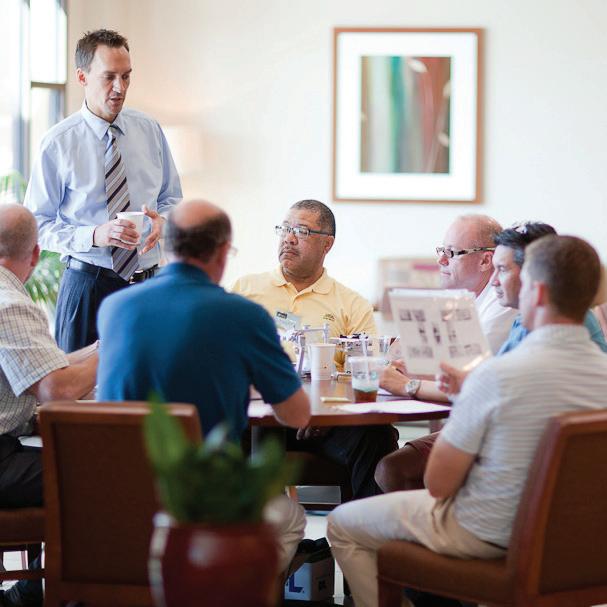
THE TRANSFORMATIVE NATURE OF SMALL-GROUP LEARNING IN DENTAL STUDY CLUBS 11
DISCOVERING
AN ‘INTERDISCIPLINARY APPROACH TO COMPLEX CASES’
In today’s era of waning commitment to dentistry, in which less than 40% of Americans visit the dentist annually, it’s imperative for dentists to work together to remain successful in a rapidly shifting marketplace.
Today, general practitioners can be overly focused on replacing the role of specialists, when that isn’t always the best approach for the patient. Still, the economics of the referral process remain at the forefront for every dentist — and optimizing time, resources and patient outcomes are paramount to long-term success.
Juggling clinical precision with the financial goals of the independent practice is a constant challenge, and many doctors struggle to find the most appropriate learning tools to adjust how they contribute to the referral process.
“When you’re not busy, sending something to the oral surgeon is like you’re sending money to them,” Dr. Frank Spear said in a Q&A published during Spear Summit 2019.
Dr. Spear, the longtime clinician and educator who co-founded Spear Education, explained how an effective study club promotes a firm understanding how various interdisciplinary roles contribute to more consistent case outcomes:
“For example, if I refer three or four extractions that I could have done myself when I wasn’t busy ... or if I send an implant to the periodontist, but I’m not as busy as I want to be, I would have gotten paid for it.
You’re seeing more restorative dentists do these procedures in their own practice to stay busier. But I don’t care how talented you are – if you’re not doing it every day, compared with someone who is, you’re not going to achieve the same results on difficult cases as a specialist who does it every day. Having said that, there are definitely very talented general practitioners who do a great job with many procedures that used to be considered the domain of the specialist. At Spear, we try to get general practitioners to recognize what is safe and predictable to produce in their own practice, and when it’s beneficial to refer.

What I believe is a major weakness of general practitioners not working with specialists, is how much they limit their diagnosis and treatment planning skills by missing out on the interdisciplinary interaction that occurs when multiple clinicians look at complex cases.
That’s the whole focus of Spear Study Club – showing an interdisciplinary approach to complex cases. That always gets a better result than trying to do everything yourself, especially in treating more complex problems.”
As part of Spear Study Club, learners access training modules developed by Resident Faculty members with decades of combined clinical experience contributing to successful interdisciplinary cases and teaching dentists how to strengthen referral relationships.
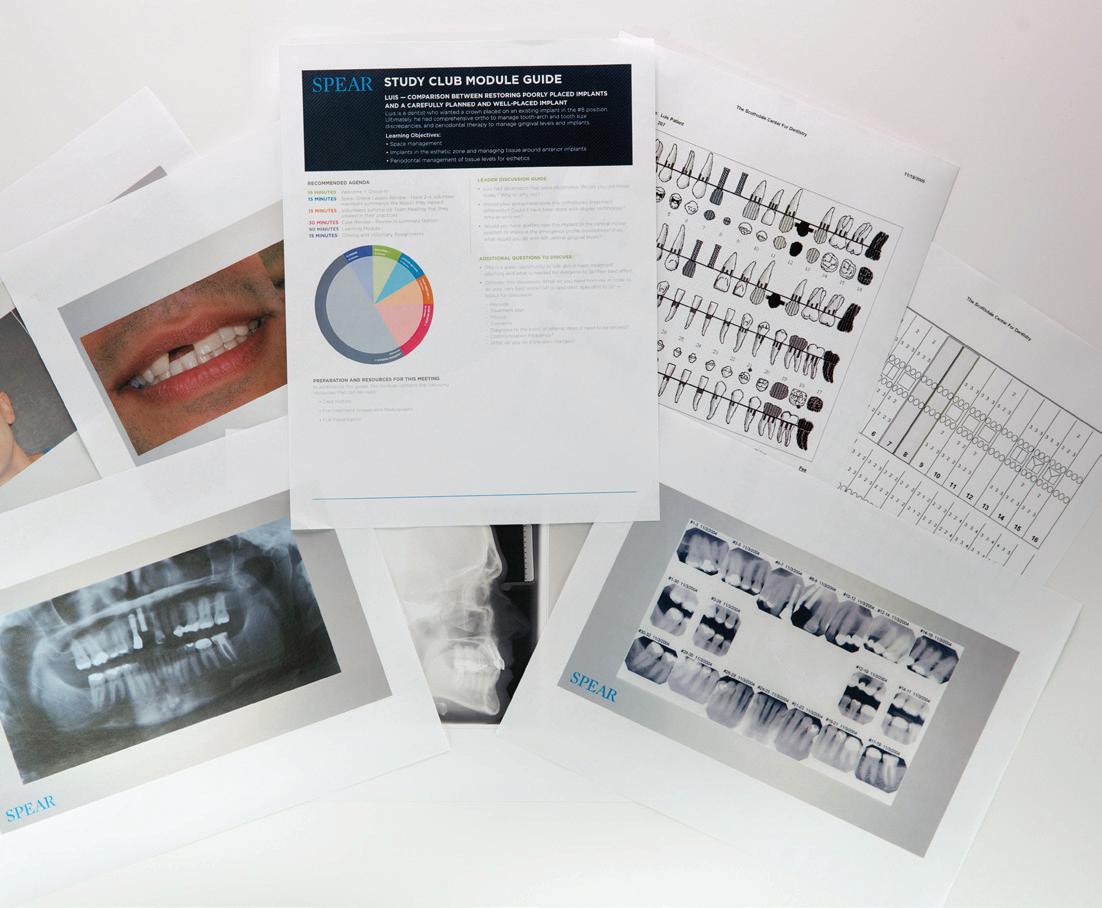
Modules provide prescribed learning that covers everything from foundational skills to steps for immediate implementation and solving complex clinical challenges.
They include:
• Guided discussion videos
• Leader discussion videos
• Digital treatment planning templates and worksheets
• Pre- and post-treatment images
• Diagnostic models
• Case history and charts
But learner commitment and involvement drive study club success. Doctors who achieve their goals with study clubs bring their own cases to discuss in their small groups and reply on supporting CE materials, traditional campus lessons and prescribed online as they feel it’s applicable for their individual club.
That combination of traditional, faculty supported lessons with student-led, self-sufficient, small-group learning is essential to growth in dentistry given the demands of maintaining effective referral relationships.
That intimacy of the home-based learning environment paired with proven clinical educational materials for support give dentists the ideal space to learn from each other — seeing the different perspectives up close, which is important because there is always more than one way to approach a case.
Spear Study Club: Small-Group Support for Stronger Referral Relationships
Learn more about how joining or leading a Spear Study Club in your community improves your own clinical approach and heightens the overall quality of dentistry in your interdisciplinary network.
Contact an advisor at 855.773.2772 for a Study Club overview or visit speareducation.com/study-club to read more.
THE TRANSFORMATIVE NATURE OF SMALL-GROUP LEARNING IN DENTAL STUDY CLUBS 13
REFERENCES
Jones, R. W. Learning and teaching in small groups: characteristics, benefits, problems and approaches. Anaesthesia and Intensive Care, 35, No. 4, August 2007, 587-592.
Arias, A., et al. Educational Outcomes of Small-Group Discussion Versus Traditional Lecture Format in Dental Students’ Learning and Skills Acquisition. Journal of Dental Education, Vol. 80, No. 4, April 2016, 459-465.
Patel, V. L., et al. Relationship Between Small Group Problem-Solving Activity and Lectures in Health Science Curricula. Journal of Dental Education, Vol. 68, No. 10, October 2004, 1058-1080.
Hands-On Case Collaboration
One restorative dentist describes how a blend of campus, lecture-based content and hands-on collaboration provides her entire study club with “clear steps for systematic treatment planning and achieving results” in their local practices.
Read the article.
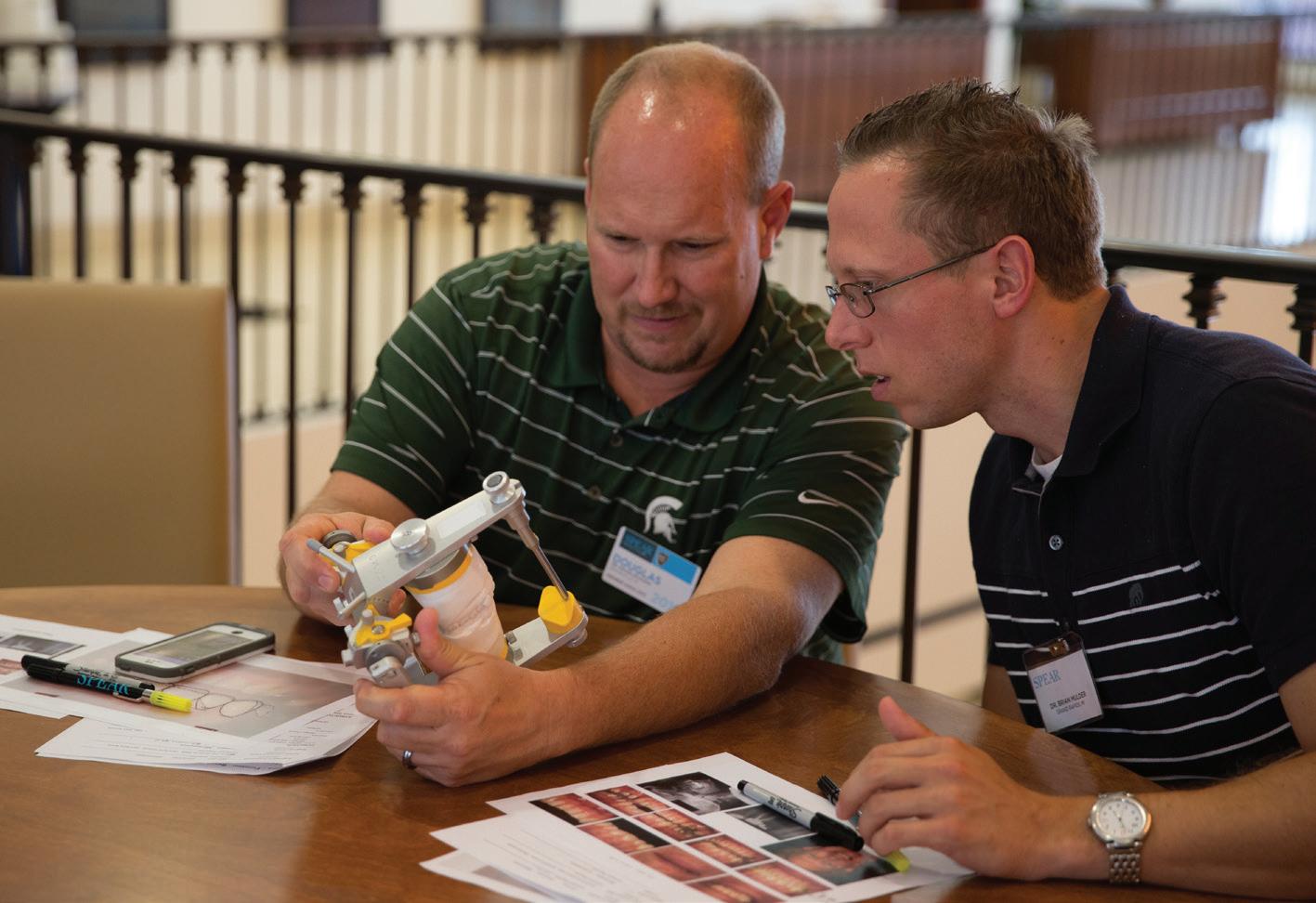
THE TRANSFORMATIVE NATURE OF SMALL-GROUP LEARNING IN DENTAL STUDY CLUBS 15
THE PURSUIT OF GREAT DENTISTRY
Based in Scottsdale, Arizona, Spear Education is an innovative dental education company that includes the following practice-building, member-based services:
Spear Online
The “Gateway to Great Dentistry” includes more than 1,500 video lessons spanning restorative, esthetics, occlusion, worn dentition, treatment planning and more. But access is not only for dentist continuing education. Membership provides the entire office team with staff training, team meeting and patient communication tools — like the Patient Education platform and native apps, in addition to “Conversation Essentials” video vignettes — to align the entire practice on patient care.
Spear Study Club
Involves small groups of peers that meet locally as many as eight times a year to collaborate on real-world cases, improve their clinical expertise and discuss growing practice profitability. Spear has the largest network of study clubs, with active clubs in more than 40 states and six countries.
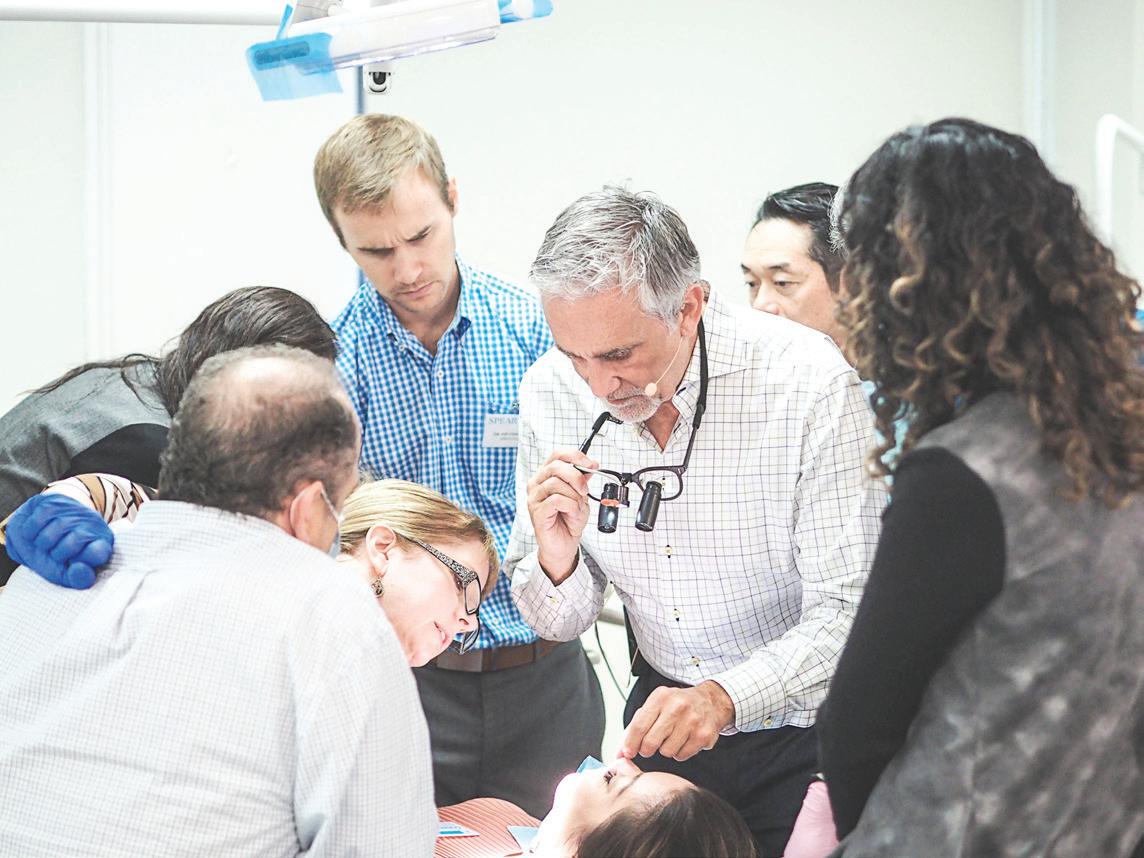
Spear
Campus
Thousands of dentists visit Spear’s scenic Scottsdale campus annually for seminars and workshops. Members attend sessions in a state-of-the-art, 300-person lecture hall and receive hands-on training in Spear labs.
Spear
Faculty Club
Designed as a prestigious community of doctors who share the journey to Great Dentistry with others. While all Faculty Club members demonstrate a commitment to continued learning, professional growth and providing the best patient care, many also serve as Visiting Faculty and mentor attendees during campus seminars and workshops.
Spear Practice Solutions
Discover how to streamline your practice and align your team for long-term growth with a unique and powerful business system that includes prescribed content for growth, leadership training for practice owners, and a real-time analytics dashboard to monitor your daily progress.
Spear
Faculty Club Elite
Grow your clinical and leadership skills with unprecedented access to thought leadership and the most forward-looking curriculum available.
THE TRANSFORMATIVE NATURE OF SMALL-GROUP LEARNING IN DENTAL STUDY CLUBS 17



















